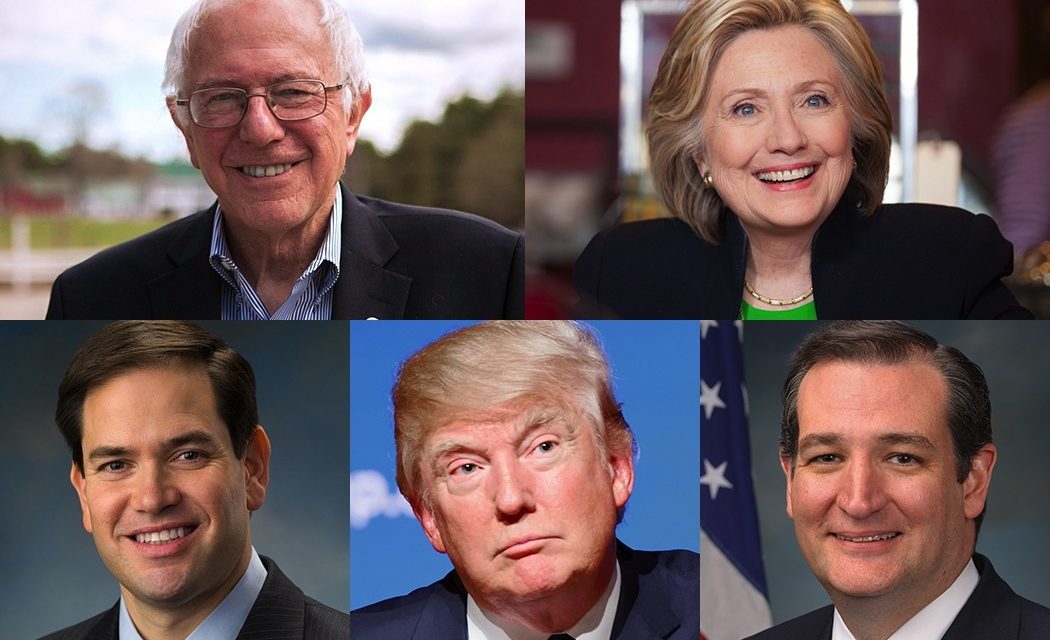Clinton cements it and Rubio turns prophet as the GOP marches toward a messy convention.
By Glenn Thrush
Hilary Clinton has been her own worst enemy at times (think homebrew servers and Goldman Sachs speeches) but her big win in Ohio Tuesday night likely catapulted her into history as the first female nominee of a major party.
Bernie Sanders’ presidential dreams aren’t quite dead. Yet his remarkable insurgency is a teetering Jenga pile of youth support, momentum and access to online millions — and Clinton just plucked out the buttressing block. She won Ohio resoundingly (her massive wins in Florida and North Carolina were a much, much bigger deal in terms of delegates) and she proved that she could capture a diverse and populous industrial Midwestern battleground a week after her shocking loss in Michigan.
This is a big haul. The delegate math for Sanders has been pretty dim since Super Tuesday, but now his core rationale (that he owned the hearts and votes of liberal and working-class northerners) suffered a serious, probably fatal, blow. He started off the night about 215 pledged delegates in the hole and will end the evening more than 300 behind Clinton, a margin bordering on the insurmountable.
Clinton’s wins coupled with Ohio Gov. John Kasich’s not-so-fast-fellas victory in his home state serve as a dual rebuke to Donald Trump, who has now become the singular focus of fire for every candidate left in the race. In fact, every podium utterance (save for Trump’s) sounded as if it had come off of the same speechwriting assembly line: America needs a uniter, not a divider; feel free to shout at my rally, I won’t beat you up; why can’t we all just get along, yadda, yadda, yadda.
The results cast the parties on divergent political paths: The Democrats seem destined to unite after a few more contests, while Kasich’s Ohio win, coupled with a possible victory by Ted Cruz in Missouri, makes it more likely than ever that the GOP is headed for a contested convention. Here are five takeaways:
1. The Gospel according to St. Marco. In many ways, Marco Rubio was at his best on the worst day of his political career, delivering an emotional — and prophetic — farewell speech that succinctly defined his divided party’s dilemma as the bitterest of primary campaigns grinds on.
The 44-year-old Florida senator, a slick, eloquent and aspirational conservative in a party that didn’t much value those attributes, was a man without a geographical or ideological foothold in the GOP, and his 20-point home state loss made soldiering on impossible. Moreover, his Miami bow-out underscored what made him fail in the first place: He touted the rebellious energy of the tea party movement while trying to put a lid on its runaway rage.
But embedded in his contradictions as a candidate was a message well worth heeding for Republicans: Anger is a niche product with an early expiration date; optimism has a wider consumer base and an unlimited shelf life.
“While we’re aware … this may not have been the year for a hopeful and optimistic vision of our future,” he said, “we want to unite this country … America needs a conservative movement, one that is based on ideas, principles. Not on fear. Not on anger. Not on preying on people’s frustrations.”
2. Democrats want to fight Trump, not each other. The exit polls were fuzzy on the topic, but the voters seemed to be sending their party a clear, collective message: Ditch the character-building internecine slap fight and unite to fight the common enemy.
In a year where establishment candidates have tumbled like protesters at a Trump rally, Clinton — the most entrenched political veteran to seek the presidency since Nixon — triumphed precisely because she is so committed to mastering of the details of a job Trump would delegate to super smart and thus-far-unidentified really terrific people.
Despite Sanders’ repeated calls for a revolution — and his seven-to-one success with voters under 30 — Democratic voters have overwhelmingly prioritized experience over a candidate’s “outsider” bona fides. That trend held in Ohio and Florida, the two biggest Tuesday prizes, where Democratic voters expressed revulsion at the spate of violent events at Trump rallies.
Clinton wasn’t subtle about pivoting to The Donald. “Tonight it’s clearer than ever that this might be one of the most consequential campaigns of our lifetimes,” the hoarse but ecstatic former secretary of state told a cheering audience in Miami. “Our commander in chief has to be able to defend our country, not embarrass it.”
Sanders?
Oh, he’d run a “vigorous” campaign, she said in passing.
3. The Battle of Cleveland. The impact of Rubio’s exit — and Kasich’s sudden rise — creates a mess of unpredictable scenarios that could end in Trump’s coronation, a contested convention or some kind of split decision that sends the GOP’s mid-July convention into fractious anarchy. For starters, it’s unclear where the Florida senator’s voters (15 to 20 percent of the GOP electorate) will go; the conventional wisdom is that Kasich will benefit more than Cruz, but that’s no lock.
The next batch of state contests — New Jersey, Arizona, Delaware, South Dakota and Montana — seem to favor Trump, but the race has entered a new volatile stage. And, increasingly, the stage seems set for some kind of showdown on the convention floor (and the streets outside) when the Republicans return to Cleveland.
4. Angry white people love Donald Trump. Does anyone else? Time to stop judging Trump by the hothouse standards of the ultra-conservative GOP primary. He’s likely (though not a lock) to win his party’s nomination, and maybe — just maybe — his rhinestone-studded gloom-and-glare won’t sell to a general electorate that is agitated, but not nearly as pitchfork-pissed as he is.
Exit polls in Tuesday’s five voting states reinforced pretty much every single prevailing assumption about Trump’s core electorate — with a vengeance. White? Totally. Older? You betcha. Angry? Man, you have no idea. When pollsters asked respondents in Florida and Ohio who were ticked off with the federal government, they picked Marco Rubio and John Kasich, who touted the standard-issue D.C.-sucks mantra of the ‘90s and ‘00s GOP.
But when pollsters amped the question to 11 — to voters who described themselves as “angry” — Trump (an orange Hulk in a pack of better-behaved Bruce Banners) destroyed the competition. If you’ve been to one of his rallies, or seen him call for anti-Trump protesters to be cuffed, bopped, arrested or chucked into the gutter, this comes as no surprise.
But here’s the rub: Even in Florida, where he dominated by 20 points over Rubio, Trump couldn’t quite get over the 50 percent mark. True, GOP rage is at a fever pitch, but it’s not universal: In fact, six in 10 Republican exit-poll respondents in all five states said they aren’t angry — and an even smaller percentage of the general electorate identifies as irate, and a lot of those voters aren’t white and aren’t conservative. Again, Rubio played prophet: “The politics of resentment of other people will not only leave us a fractured party but will leave us a fractured nation.”
5. Bernie is being kept alive by independents. Clinton’s convincing victory in Ohio was all the more impressive because it took place in an open primary state that permitted same-day registration by independents. But exit polls, and reports from both campaigns, indicate that Clinton cleaned up by intensifying her turnout operations in black communities (she had a net 15-point lead in Ohio among registered Democrats) not by crossing over to working-class whites and young people who are more prone to avoid party affiliations.
In Illinois, Clinton lost indies by a roughly 75-to-25 percent margin — similar to the ratio that doomed her in Michigan a week ago. Trump, like Sanders, feasts on independents and thrives in open primaries, and Clinton’s staff acknowledges she has to cut into those margins to succeed in the fall. “It’s a serious problem,” a senior Clinton staffer told me. “It’s something we are going to be focused on once — I mean if — we get past Bernie.”



















